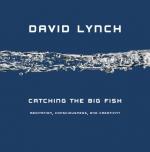|
This section contains 385 words (approx. 1 page at 400 words per page) |

|
Catching the Big Fish Summary & Study Guide Description
Catching the Big Fish Summary & Study Guide includes comprehensive information and analysis to help you understand the book. This study guide contains the following sections:
This detailed literature summary also contains Topics for Discussion and a Free Quiz on Catching the Big Fish by David Lynch.
David Lynch is a world-renowned film maker and director. Since the 1970s, Lynch has brought a unique surrealistic quality to cinema, effectively marrying art house cinema with commercial Hollywood. In Catching the Big Fish, Meditation, Consciousness, and Creativity, Lynch shares many experiences spanning his three decades in the film industry. The book is much more than that, however. One of Lynch's primary purposes in writing this tome was to introduce Transcendental Meditation to his legions of followers.
Lynch has practiced Transcendental Meditation (TM) since 1973, meditating twice daily, at minimum. The method of transcending, meditating with the use of a mantra, has taken Lynch to a new place. This place is called the "Ocean of Pure Consciousness," and it underlies everything we do and everything we are. In this ocean, one is able to experience bliss. There is an expansion of intellect and spirit. In this ocean, life's problems come into focus and many fade away. Many find untold amounts of creativity and wisdom.
On a scientific level, the ancient practice of meditation or the realization of the Self, wasn't proven until the theory was tackled by quantum physicists. The physicists were able to measure brain wave activity and in the end, determined that there is, in fact, an underlying place that relates to everything. They call it The Unified Field - same concept, different name.
Lynch is obviously a huge supporter of TM. The author claims a wide array of benefits, from removal of anger and depression to increased intellect and intuition. Once a person has experienced the ocean of pure consciousness, the mind grows and is able to accept so much more. The more one practices, the more one can tap into the bliss.
Lynch's enthusiasm is almost repetitive at some points, yet it all ties together in the end. It is apparent that TM has affected every aspect of the author's life, and he credits his experiences for always finding the next right thing. When it comes down to it, everything and everyone is related. The answer to any problem is accessible and waiting to be found. Along the way, one will learn to appreciate the world and all its beauty. Creativity will soar. Lynch says that he has been lucky and wishes for all to have the same.
Read more from the Study Guide
|
This section contains 385 words (approx. 1 page at 400 words per page) |

|



